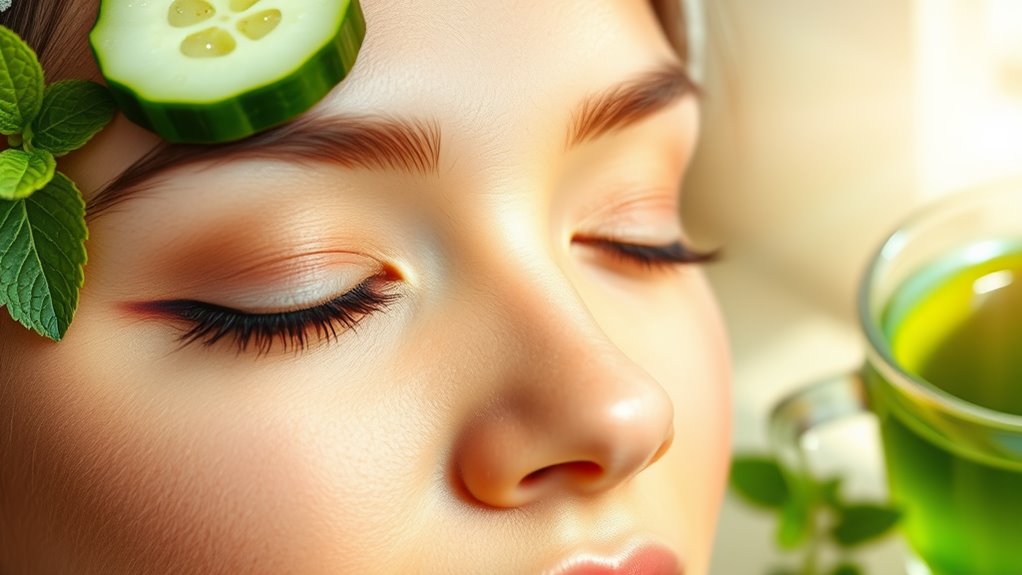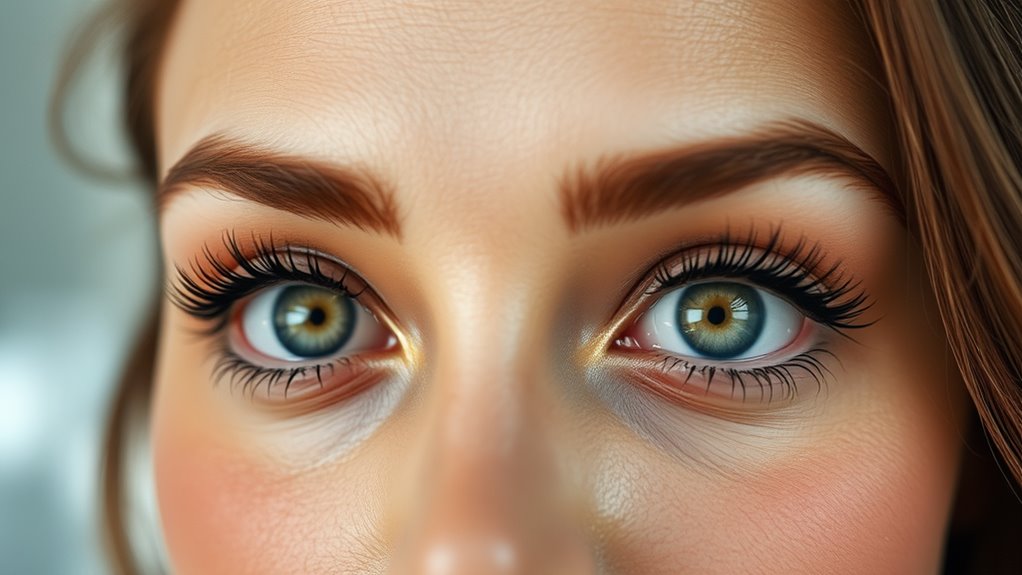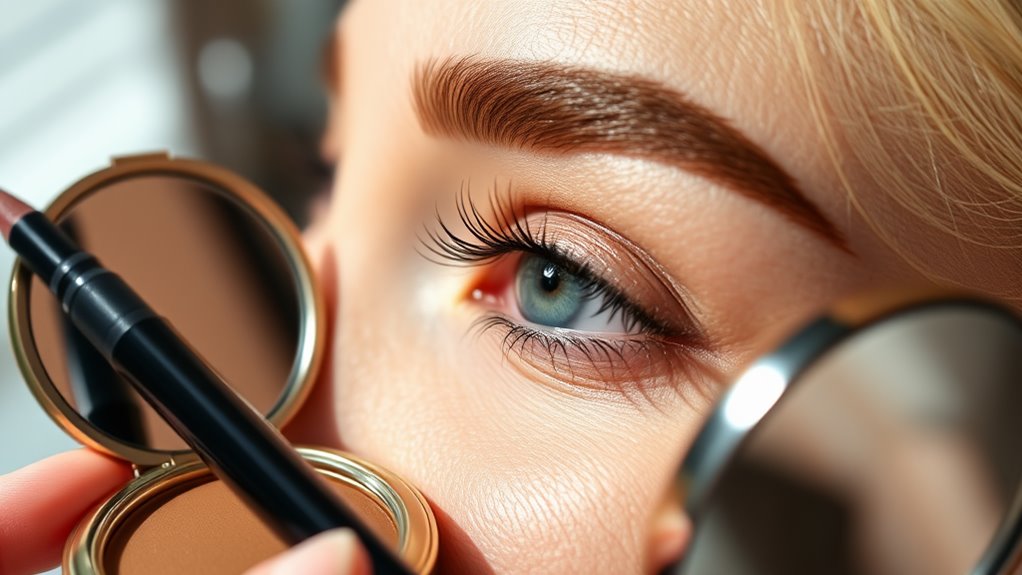How to Refresh Tired Eyes Without Eye Creams
To refresh tired eyes without creams, start by staying hydrated—drink plenty of water and munch on hydrating foods like cucumbers. Try natural remedies like placing cool cucumber slices or chilled chamomile tea bags on your eyes. Incorporate eye exercises, like the 20-20-20 rule or gentle eye rolls, to relax your eye muscles. Make lifestyle adjustments by ensuring enough sleep and taking regular breaks from screens. There’s more to discover about maintaining vibrant eyes.
Key Takeaways
- Use cool cucumber slices on your eyes to soothe inflammation and refresh tiredness.
- Place steeped and cooled chamomile tea bags on your eyes for a calming effect.
- Splash your face with cold water to invigorate your senses and reduce puffiness.
- Practice the 20-20-20 rule to relax your eye muscles by looking at something 20 feet away for 20 seconds every 20 minutes.
- Stay hydrated by drinking plenty of water and eating hydrating foods like cucumbers and oranges to maintain eye moisture.
Hydration: The Key to Bright Eyes
How often do you think about the impact of hydration on your eyes? Staying hydrated is essential for maintaining bright, clear eyes.
When your body lacks water, your eyes can become dry and fatigued, leading to discomfort and diminished clarity. To achieve that sought-after eye refresh, drink plenty of water throughout the day and consider hydrating foods like cucumbers and oranges. Additionally, incorporating hydrating beverages can further enhance your skin health and overall appearance.
You mightn’t realize it, but even the air quality in your environment plays a role. If you’re in a dry area, using a humidifier can help keep your eyes moist.
Natural Remedies for Soothing Eye Fatigue
When your eyes feel tired and strained, turning to natural remedies can offer quick relief. One effective method is applying cool cucumber slices over your closed eyelids. The antioxidants and hydrating properties soothe inflammation and refresh your eyes.
Alternatively, you can steep chamomile tea bags, let them cool, and then place them on your eyes for a calming effect. Another option is to splash your face with cold water; the shock can invigorate your senses and reduce puffiness. Additionally, using cooling tools like gel eye masks can further enhance the de-puffing effects of these remedies.
Finally, try using a warm, damp cloth to gently massage your eyelids; this can enhance circulation and alleviate tension. These simple, natural remedies can help you regain clarity and comfort without relying on commercial products.
Eye Exercises to Combat Tiredness
Incorporating eye exercises into your daily routine can considerably reduce fatigue and strain. Start with the 20-20-20 rule: every 20 minutes, look at something 20 feet away for 20 seconds. This simple practice helps relax your eye muscles.
Next, try the “palming” technique—rub your hands together, then gently cup your palms over your closed eyes for a minute. It promotes relaxation and soothes tension.
Additionally, perform eye rolls by looking up, down, left, and right, holding each position for a few seconds. You can also focus on a near object, then switch to a distant one, repeating this for several cycles.
Regularly doing these exercises sharpens focus and enhances overall eye health, keeping tiredness at bay. Furthermore, incorporating natural remedies such as warm compresses or cucumber slices can provide additional relief and rejuvenation for your eyes.
Lifestyle Changes for Eye Health
Alongside eye exercises, making specific lifestyle changes can greatly improve your eye health and help reduce fatigue.
Here are four key adjustments you can implement:
-
Stay Hydrated: Drink plenty of water daily to keep your eyes moist and reduce dryness.
-
Limit Screen Time: Follow the 20-20-20 rule: every 20 minutes, look at something 20 feet away for 20 seconds to alleviate strain.
-
Prioritize Sleep: Aim for 7-9 hours of quality sleep each night to allow your eyes to recover. Proper sleep positioning can further enhance your rest and minimize under-eye circles.
-
Eat a Balanced Diet: Incorporate foods rich in vitamins A, C, and E, as well as omega-3 fatty acids, to support eye health.
Preventive Measures for Long-Term Eye Vitality
To maintain long-term eye health, it’s essential to adopt preventive measures that protect your vision and enhance overall eye wellness.
Start by incorporating regular eye exams into your routine; this helps catch potential issues early. Prioritize a balanced diet rich in omega-3 fatty acids, antioxidants, and vitamins A, C, and E to nourish your eyes.
Don’t underestimate the power of proper hydration; it keeps your eyes moist and reduces fatigue. Additionally, practice the 20-20-20 rule: every 20 minutes, take a 20-second break to look at something 20 feet away.
Finally, shield your eyes from harmful UV rays by wearing sunglasses with 100% UV protection when outdoors, and limit screen time to reduce digital strain. Your eyes will thank you. Furthermore, consider using products with caffeine-infused eye rollers as they may help reduce puffiness and dark circles.
Frequently Asked Questions
Can Diet Impact the Appearance of Tired Eyes?
Yes, your diet can greatly impact the appearance of tired eyes. Eating nutrient-rich foods, staying hydrated, and avoiding excessive salt or sugar can help reduce puffiness and dark circles, giving your eyes a refreshed look.
How Does Sleep Quality Affect Eye Freshness?
Sleep quality directly impacts your eye freshness. When you get enough restorative sleep, your body rejuvenates, reducing puffiness and dark circles. Prioritize deep, uninterrupted sleep, and you’ll notice a significant improvement in your eye appearance.
Are There Specific Foods That Help Reduce Eye Fatigue?
Yes, certain foods can help reduce eye fatigue. Incorporate leafy greens, carrots, and fish rich in omega-3 fatty acids into your diet. These nutrients support eye health, boost circulation, and combat fatigue effectively.
What Role Does Screen Time Play in Eye Tiredness?
Screen time considerably contributes to eye tiredness by straining your eye muscles and causing dryness. You should take regular breaks, adjust screen brightness, and practice the 20-20-20 rule to minimize discomfort and fatigue.
Can Stress Contribute to the Appearance of Tired Eyes?
Absolutely, stress can definitely contribute to the appearance of tired eyes. When you’re stressed, your body’s hormones fluctuate, leading to fatigue and eye strain. Managing stress effectively can help brighten your eyes and overall appearance.





